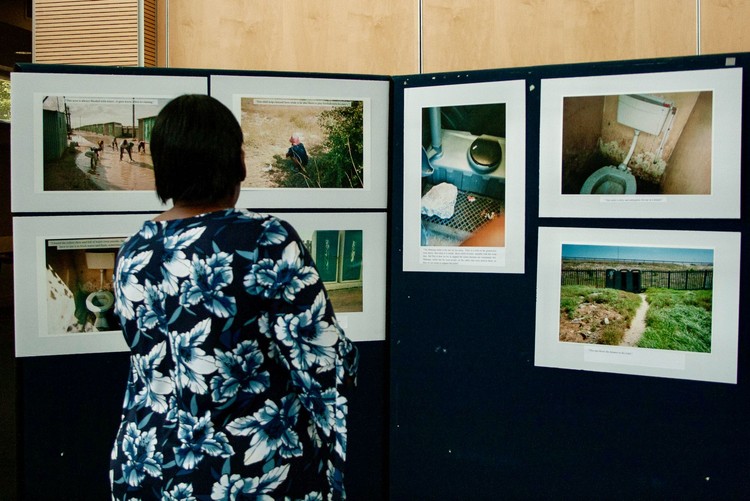Khayelitsha residents document their daily struggle with toilets
Photographic exhibition shows access to sanitation from the perspective of people living in informal settlements
Residents of BM section in Khayelitsha exhibited photos they took for new research by the Politics and Urban Governance Research Group (PUG) on 16 November. Photo: Liezl Human
Khayelitsha residents exhibited photos they took of toilets in informal settlements on Thursday. The event was under the auspices of the Politics and Urban Governance Research Group (PUG) and took place at the University of Western Cape Public Health building.
Thirteen residents from BM section were trained to use cameras using film to document their daily experiences with ablution facilities.
“We told them to tell a story of their access to sanitation from their perspective,” PUG researcher Mfundo Majola told GroundUp.
Initially, it was for research purposes, not for exhibition.
“Sometimes communities are so exhausted from being over-researched and nothing happens,” he said.
Residents of BM section told them they wanted to see that the information reached the City and that they had an opportunity to speak to officials.
The research showed that access to portable flush toilets – the most widely used type of toilet in BM section – improved vulnerable residents’ privacy, safety and dignity.
Households using container-based sanitation facilities have poor access, limited privacy and safety concerns. In some cases people padlock the communal facilities and only give access to friends and family.
People with disabilities, such as participant Fundasani Roro, say a better system is needed for them, and also for older people.
City of Cape Town officials and the BM section ward councillor attended the exhibition and took questions.
Riana Pretorius, City director of informal settlements, said high density areas made installing and maintaining sewer lines and infrastructure very challenging.
Mayco Member for Water and Sanitation Zahid Badroodien said the provision of services to informal settlements was “a moving target”. Badroodien said that between 2020 and 2021, 186 new informal settlements were established and 60% of these were in “high-risk areas”, such as under power lines, in wetlands, on the side of the roads, retrenchment ponds or nature reserves. In such cases the City of Cape Town is not permitted to provide services, he said.
Support independent journalism
Donate using Payfast

© 2023 GroundUp. This article is licensed under a Creative Commons Attribution-NoDerivatives 4.0 International License.
You may republish this article, so long as you credit the authors and GroundUp, and do not change the text. Please include a link back to the original article.
We put an invisible pixel in the article so that we can count traffic to republishers. All analytics tools are solely on our servers. We do not give our logs to any third party. Logs are deleted after two weeks. We do not use any IP address identifying information except to count regional traffic. We are solely interested in counting hits, not tracking users. If you republish, please do not delete the invisible pixel.

